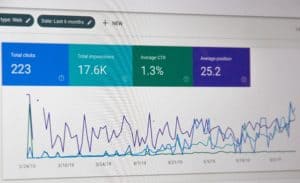Where were you on March 11?
Following March 11, many of our association clients began to see their website traffic dramatically drop due to a shift in search behavior. At first, the drop was thought to be an unforeseen Google algorithm update—clients were wondering if and why their sites were being penalized. The real cause? On March 11th the World Health Organization (W.H.O) declared the coronavirus a global pandemic and that changed more than just our social norms—it changed web search behavior which affected search results. Our Google Analytics data showed a direct correlation between newly added COVID-19-related content and reduced traffic. This rare and dramatic fluctuation forced us to step away from the data and evaluate things from a different perspective; our observations/questions were:
- There is a global pandemic
- More people are at home
- People are searching for the latest and most accurate information on how to stay safe
- What is considered legitimate COVID-19 information versus fake?
Regardless of the reasons behind the dip, we needed to find a solution and fix the problem.
Understanding what you EAT invoked by consumer behavior
An updated Google algorithm wasn’t the culprit, but how its algorithms work was. Research shows that Google is optimizing their algorithms to change consumer behavior by embracing sites that offer expertise, authoritativeness, and trustworthiness (EAT). When indexing sites, Google examines the website’s purpose (including those sites that belong to our associations) and its status online in order to determine if COVID-19-related content meets Google’s EAT criteria. What we are finding is that associations are providing COVID-19 resources (podcasts, blog posts, employee protocols) that are valid, but unbeknownst to them, Google feels do not meet the EAT criteria. Google simply does not recognize the organizations as an authority on COVID-19, which leads to penalization from Google.
The big question is why? You may not be aware that Google buckets your association into a group of similar organizations and within those groups are subgroups of subgroups. This is why when you search for your association in Google, you see other similar associations show up alongside yours. Unfortunately, when one or more sites within the group are penalized by Google for not meeting EAT criteria, all group members are affected. Being placed in the wrong group, often dictated by the content on your website, can harm your website traffic.
This blanketed approach may sound nonsensical, but hear us out. We too were skeptics until we began evaluating aggregate client data when traffic fell off of a cliff. We have clients in many categories of the association world, from science and engineering to electronics and healthcare. While all experienced traffic loss, surprising to us was the effect on our healthcare clients. It made sense for our non-healthcare clients, but we felt medical-focused websites should have seen an increase because COVID-19 is a medical issue. Logically … we felt that more COVID-19 content would mean more traffic. So … what happened here?
The answer: it comes back to the groups
When we evaluated one healthcare client’s website (they serve surgeons), we saw they were actively releasing podcasts and blogs from real surgeons about how COVID-19 has affected the medical community. Why they were being penalized was a head-scratcher until we evaluated how this particular association is grouped from a search perspective.
First, the association is grouped with other medical-related organizations, to which their site was compared. We determined that because Google’s COVID-19 data doesn’t include surgery in the scope of COVID-19-related medical services (as compared to other group members), they (wrongly) determined that this association’s content was trying to capitalize on the pandemic. While the intent was innocent and relevant, Google still penalized them.
To solve the problem, we disabled their COVID related pages from being indexed by Google but kept the information separate and available on the website. This meant that a visitor could still read and engage with the content, but Google couldn’t. Slowly but surely the ranking data came back up to near-normal levels in a matter of two months.
Why this all matters regarding consumer behavior
This unusual time provides all associations a rare glimpse into what can happen when search behavior meets something the organization didn’t anticipate and deviates from the norm. In the case of COVID-19, more people searched for related content, which meant Google scrutinized content heavier to ensure it met its EAT criteria, which lead to unforeseen penalizations. As consumer behavior returns to normal, so will search behavior.
We cannot emphasize enough how important it is to consistently review your analytics data weekly or bi-weekly. A drop in traffic can result in a drop in revenue and while it’s not always obvious what has caused the issue, it’s important to acknowledge it, figure it out, and don’t assume it’s going to go away. Additionally, a DJG SEO Audit will allow us to determine how you will be grouped and how we can steer the cart towards where you want to be. You don’t have to stay in the group you’re put in. We can change that.
Until we’re out of the COVID-19 woods, we encourage you to keep checking your data and reach out to DJG if you need Google Analytics expertise.
